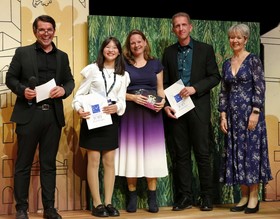A Celebration of Cinema
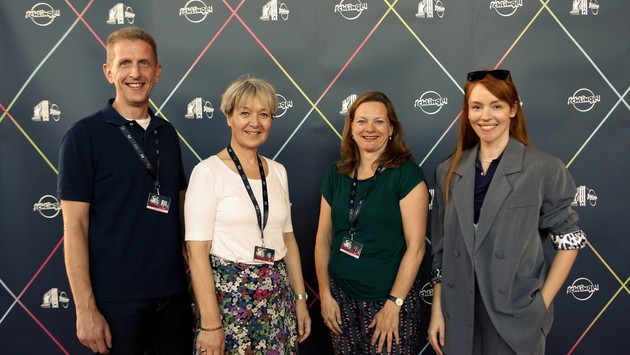
Ecumenical Jury Chemnitz 2023, from left: Martin Ostermann, Anja Klinkott, Rinke Dellebeke-van-Hell, Olimpia Melinte (© IFF SCHLiNGEL/Fotografie Daniela Schleich)
In the east of Germany, somewhere between Leipzig and Dresden, the city of Chemnitz turns into a children’s walhalla every year, just before the start of the autumn holidays. That’s when the SCHLiNGEL film festival starts – and children take their classes at the cinema rather than at school.
How I would have loved to be a Chemnitz’ student in that particular week in September or October. Luckily, I was invited to serve on INTERFILM’s and SIGNIS’ Ecumenical Jury this year from 23rd -30th September 2023, together with Olimpia Mentel (Romania), Anja Klinkott (Germany) and Martin Ostermann (Germany). That was an absolutely wonderful experience, not only because the four of us really formed a good team but also because SCHLiNGEL is a great festival. While working as a programmer and publicity worker in Dutch film theatres, I have attended quite a few film festivals over the years, but none as charming and rewarding as this diverse international children’s festival. Showing an impressive 171 films from 54 countries in 5 competitions for the different age groups, animation films and short films, the festival really offered an exceptionally strong programme. Never before have I liked (rather: loved) more than 2/3 of the selected films for us.
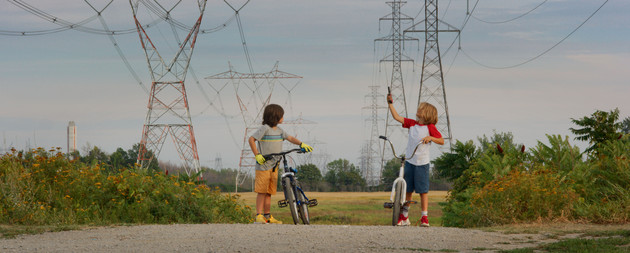
A significant part of our favourites were part of the special Quebec focus this year. Ranging from the very touching winner of the Fipresci Award Echo to Delta (Patrick Boivin) to the highly amusing winner of several prizes Coco Farm (Sébastien Gagné), this section of the programme shed some light on the productive film culture of the province of Quebec, which seems to be quite diverse, full of talent and with a particular focus on the creativity and ingenuity of children.
Echo to Delta (>12 years) is a very well made, highly emotional story about two brothers who are convinced that there are extra-terrestrial civilisations waiting to make contact with Earth. They use their walkie-talkies not only to communicate with each other but also as a form of antenna to look for alien signals. One stormy night the youngest brother David is struck by lightning and dies. His older brother Etienne is sure that David is abducted by aliens and he interprets all attempts to convince him otherwise as signs of a conspiracy. What makes the film so beautiful, is that it fully takes the perspective of Etienne and his friends, leaving the mourning process of his parents to the background. The only one who really helps Etienne is an elderly owner of a car scrapyard, who helps Etienne build his own spaceship. Etienne’s creativity is shown in his craftwork and interpretations of reality, which the audience is to take very seriously. A smart combination of animation, CGI and simply brilliant filmmaking make sure that Echo to Delta is not soon forgotten. (Tip: bring a lot of tissues!)
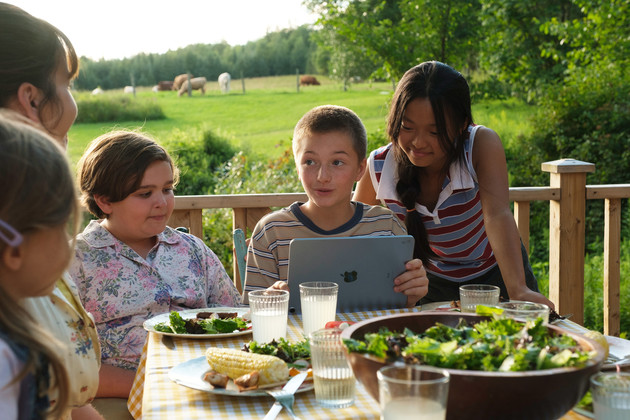
Coco Farm (>9 years) is quite the opposite in genre, but just as cleverly made. Twelve-year-old Max is forced to give up his pawnshop in his father’s garage when they move to the countryside, far away from Montreal. Max tries to make up for the financial shortcomings of his father, but he rather doubts that business opportunities will arise in such a quiet village. He soon discovers he’s wrong – helped by his academically struggling cousin and a very digitally smart classmate, Max starts his own egg farm: Coco Farm, ‘where chickens are loved’. After some initial challenges, the start-up is a huge success – until bureaucracy gets in the way. Children will pick up on the funny story and the warm atmosphere of the little town, adults will be amused by the subtle comments on the western societies of the 21st century. If nothing else, the film shows that sometimes children can do a lot better in life than some adults. All in all, Coco Farm is a very charming little film that deserves a large audience in Europe.
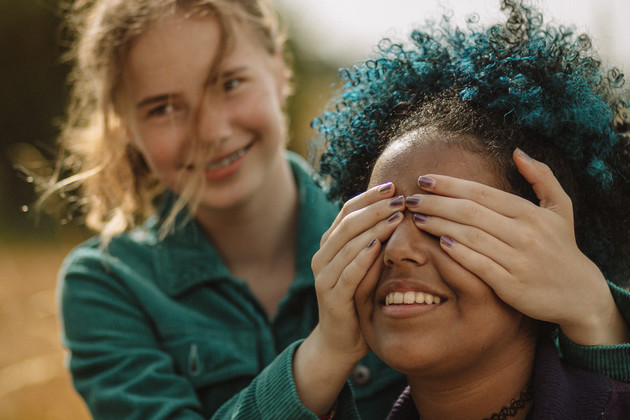
The European films in our selection were very worthwhile too. As a jury, we were very taken away by the Dutch television film Okedoeibedankt (Okthanksbye) by veteran filmmaker Nicole van Kilsdonk (Netherlands, 2023). The story follows Jamie and Imane, two deaf teenagers who need to travel from their boarding school to the centre of Paris because Jamie’s grandmother (also deaf) is suddenly taken to hospital. Van Kilsdonk uses the score and camera to draw the audience into the deaf subculture, that we usually do not experience from the inside. Okdoeibedankt is thus not only a really nice road movie but also an important contribution to a more inclusive culture.
Eventually, we decided to award our Prize to the French film Juniors (>12 years, Hugo Thomas, France, 2022) with the following motivation:
“This film courageously navigates the delicate balance between humor and heart, presenting a captivating tale of redemption. The strongly performed coming-of-age film offers typical elements of the genre but transcends clichés through an unconventional premise. In a world where superficial desires can sometimes cloud our judgment, this movie serves as a poignant reminder of the power of self-reflection and the capacity for change within us all. The story is told from the viewpoint of young people, in whose universe adults are mostly out of view. The film never condemns or overstates its message, but nobody will leave the room untouched. It encourages us to reflect on our own actions, fostering empathy and understanding in the process. In the end, we are left with a powerful message about the resilience of the human spirit and the potential for a real connection between humans. Congratulations to a movie that goes beyond the surface and leaves a lasting impact on our hearts and minds.”
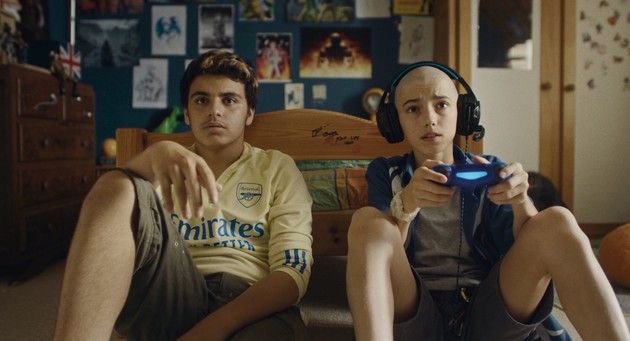
Though Juniors was a clear winner, the jury wanted to give a bit of extra attention to yet another little diamant: The Gift by Dalmira Tilepbergen (>9 years, Kyrgyzstan, 2023). This film really is a cinematic journey, taking us to the heart of Kyrgyzstan. The main actress certainly stole our heart! From the jury motivation:
The film navigates the delicate nuances of gender expectations, shedding light on the challenges faced by individuals feeling trapped within cultural norms. Traditional life high up in the mountains of Kyrgyzstan offers children a lot of freedom, but also requires clear patterns of behaviour and roles. Based on the director’s personal memories, it invites us to question societal constructs and explore the profound impact they have on family dynamics. As our protagonist embarks on a touching journey of self-discovery, we witness a universal quest for acceptance and love. The Gift stands as a beacon of compassion, urging us to embrace the diversity of human experience and celebrate the human desire for love and acceptance. A beautiful narrative that not only entertains but also encourages us to reflect on our own beliefs and biases.
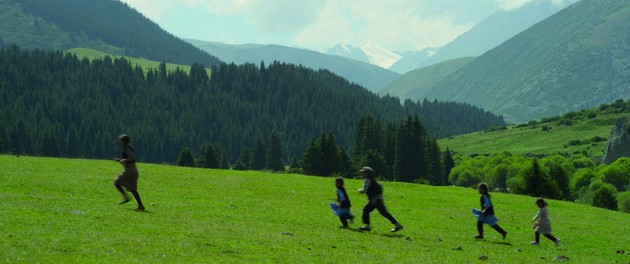
Looking back on the festival, it wasn’t only the strong programme that make SCHLiNGEL such a nice experience. The connections between the professionals who visit and the festival itself are very strong and the festival pays great attention to their guests. Because most main characters are children, many of the visiting actors are teenagers, not much older than the characters they play. The festival team goes to great length to make these children (and their parents) feel at home, including organizing a trip to Dresden. It was nice to see how the children were strolling through Chemnitz as a little troupe, having fun and getting to know each other. Another great aspect of SCHLiNGEL is the attendance of school classes. During morning screenings, the rooms were packed with children of teenagers and the moderators made sure that everyone made the most out of the experience through Q&A sessions afterwards. Every child was challenged to think about the films they’d seen and the relationship with their own lives. Before or after the screenings, the festival offered various workshops. This way, SCHLiNGEL takes its part in media pedagogy, a much needed subject in modern day’s society. All in all, SCHLiNGEL is not just fun to go to, it also functions as a celebration of cinema – both for children and adults. Highly recommended, for cinema fans ánd professionals in the industry!

